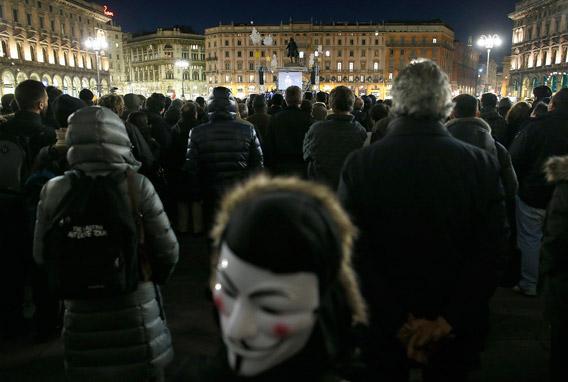Today, the fate of the world economy rests with an Italian stand-up comedian. This was not supposed to happen. The center-left Italian Democrats spent the entire campaign with strong leads in the polls. Foreign reporters swooned over “Operation Ohio,” fresh-scrubbed Italian politicos trained by the Obama campaign taking their new tactics into swing state Lombardy.
Then came Beppe Grillo, a brillo-haired, economics-trained comic with a blog and a 1980 vehicular manslaughter conviction. His Five Star Movement ticket looked completely ridiculous, until it surged into third place. Grillo’s rallies attracted tens of thousands of people, then 100,000. Grillo’s platform called for a living wage and for priests to have children “so they don’t touch other people’s.” That, added to his aggressive social media campaign—nearly a million followers on Twitter—carved out 25 percent of the vote, denying a majority to the center-left, sending investors into a now-familiar panic, the Dow Jones index falling by 216 points.

Photo by Stefano Rellandini/Reuters
After all, this is Italy we’re talking about. Political stasis is such a steady part of Italian life that the lede to one Associated Press story—“investors worry that Italy could be seized with political paralysis”—was an accidental fount of chuckles. What makes Grillo interesting is the way his Five Star Movement was built. The candidate list was assembled in online conventions. Party members clicked the names of three candidates, and those with the most clicks got onto the ballot. That was exactly what the late, unlamented Americans Elect Party tried to do in 2011 and 2012. They spent $35 million and held an online convention, asking real people to pick a bipartisan ticket. A few thousand people voted to nominate Buddy Roemer—and this was after the Republican gadfly actually campaigned for the nomination.
It failed spectacularly for Americans Elect, so why did it work for Grillo? Easy: No matter how much money is shoveled over to “centrists,” political change doesn’t come from reasonable people. It grows out of mania and cold fury.
“A third party needs some igniting figure,” says Bill Hillsman, who made ads for Jesse Ventura when he was elected governor of Minnesota. “That was the failure with Americans Elect. Our office actually called Americans Elect at one point and asked, hey, do you need to be a Republican or a Democrat to get nominated? They waited three days. Then they called us and they said, well, if a true independent went on the ticket, the other person would have to be a Democrat or a Republican.”
As it collapsed, Americans Elect launched a quasi-campaign to promote the possible candidacy of David Walker. Here was a pleasant but colorless former U.S. comptroller who banged on constantly about the need for a grand bargain. For some reason, Americans didn’t rush to hoist his banner. “People are telling you that you have to have austerity, austerity, austerity,” says Hillsman. “Then the government is doing all this profligate spending and unethical things. This is the dynamic in America: We want to express our dissatisfaction in the most memorable way possible. We want to start throwing TVs out windows.”
There’s a lot of that going around. Italy’s Grillo tantrum is the latest in a series of voter rebellions, in wildly different systems, all in countries where faith in the establishment has collapsed.
In Germany, the libertarian Free Democratic Party, a frequent coalition partner in government, has collapsed to a third of its previous support. The Pirate Party—one of many European parties with that name, and with a left-right platform of guaranteed income and copyright freedom—has surged into the gap.
In Haiti, Western investors largely wanted the ruling Unity Party to take the 2011-12 presidential elections. The winner, after a string of crises, was a dancehall singer named Michel “Sweet Micky” Martelly, who rose from joke status to become the candidate of anti-government fury.
In Greece, the Golden Dawn party—reconstructed neo-Nazis in a country once terrorized by the Nazis—entered the 2012 elections as a fringe group with a base of 20,000 votes. They ended up with more than 420,000 votes and 18 seats in Parliament.
Anyone trying to find some ideological linkage across the time zones is going to come up empty. That Greek election, which gave a narrow victory to European Union-backed austerity-crats, looks like a miracle compared with the mess in Italy. The only constant: Voters despise their choices and swing for the “screw it, blow up everything” party over the austerity party.
“I take what happened in Italy as a good sign,” says Kinky Friedman, the country singer/novelist/amateur politician who ran for governor of Texas in 2006. “I think if Jesus were to run here in Texas as an independent, he wouldn’t do as well as they did.”
In 2006, before the economic crisis, Friedman got around 547,000 votes with a grab bag of issues and a simple slogan: “Why the hell not?” He’s still inscrutable. Two years ago he endorsed Rick Perry for president; he now says that his “dying wish is to be cremated, and have the ashes thrown in Rick Perry’s hair.” This is Friedman’s way of saying he’ll probably run for the Democratic nomination this time, campaigning to legalize casinos and marijuana, working inside the party structure to destroy what the parties stand for. The dream of a prefab centrist party has no real constituency. The crazy rejectionist movement has lots of constituencies, all over the planet.
“L’onestà andrà di moda!” tweeted Beppe Grillo as the votes came in. In English: “Honesty will be fashionable again!”
